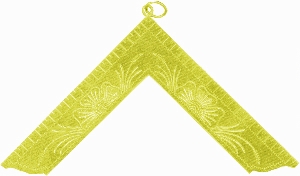 The Worshipful Master
The Worshipful Master
The Master’s jewel is the Square, a stonemason’s tool to ascertain true and correct angles of the cut and smoothed stone…thus his jewel symbolizes virtue.
The Worshipful Master sits in the East of the Lodge room, symbolic of the Rising Sun in the East, and directs all of the business of the Lodge. While most Masonic Lodges are built with an East-West orientation, even if the building faces a different direction, the Master is said to be “in the East”. He also presides over ritual and ceremonies.
His position is similar to a President of any other organization. As Master, his word is final over any and all actions pertaining to his Lodge.
It is his duty to, “…set the Craft to work and give them the necessary instruction for their labor”.
The Worshipful Master’s term of office s typically one year and he is responsible for everything within his Lodge during that year as Master of the Lodge. He is ultimately responsible for every other Lodge officer and their duties, all of the Lodge committees, the ritual and degree work, Masonic education, social functions, fundraisers, District and Grand Lodge liaison, the monthly newsletter called The Trestleboard, communications and all of the happenings at the Lodge.
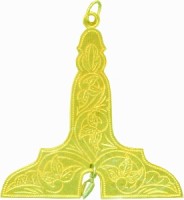 Senior Warden
Senior Warden
The Senior Warden’s jewel is the Level…symbolizing (and helping to ensure) that all Masons meet on the level, without regard to social, political, religious beliefs or status. He is the “second in command” within the Lodge Officers and in the absence of the Worshipful Master assumes the duties of the Worshipful Master. The Senior Warden of a Masonic Lodge sits in the West, symbolic of the setting sun.
His position is similar to a Vice-President of any organization. His ancient duties were to pay the Craft (the members of the guild or laborers) their wages and to handle disputes among the workers. It is his duty to support the Worshipful Master and to prepare himself to move into the office of Worshipful Master the following year.
 Junior Warden
Junior Warden
The Junior Warden’s jewel is the Plumb, a stonemason’s instrument used for determining the alignment of a vertical surface. It symbolizes upright behavior among Masons. He sits in the South, symbolic of the position of the sun at mid-day and is responsible for the members while the Lodge is at ease or “refreshment“.
The Junior Warden is “third in command” of the Lodge. His position is similar to a Second Vice-President. In the absence of the Worshipful Master and Senior Warden, it is the responsibility of the Junior Warden to open and govern the lodge. It is also his duty to arrange meals for the lodge aided by the Senior and Junior Stewards. Symbolically, it is also his duty to make certain that the members do not convert their refreshment into “intemperance or excess“. This is a holdover from earlier days, which still remains as part of the Junior Warden’s job description. He is also responsible to mentor younger members of the fraternity, to arrange for the degrees for candidates that want to join the fraternity and to help in any other manner that he is able.
 Senior Deacon
Senior Deacon
His jewel is the Square and Compass with the Sun in the middle. His position is that of a manager level in the lodge and he sits to the right of the Worshipful Master in the East. His primary duty is to relay orders from the Worshipful Master to the Senior Warden and elsewhere about the lodge as directed. He also welcomes visitors as well as candidates into the Lodge, introduces distinguished visitors and guide new candidates during the degree rituals.
During the opening and closing ceremonies, the Senior Deacon opens the Holy Scriptures to the correct passage of the particular degree being worked and closes it after the Lodge is adjourned. He lights and extinguishes the candles at the altar and assists in balloting when new members are being voted upon.
The Senior and Junior Deacons both carry long staffs or rods adorned with the symbol of their office as messengers of the Worshipful Master. The staffs are symbolic of the caduceus (or wand) that the Roman winged god and messenger Mercury carried during their duties.
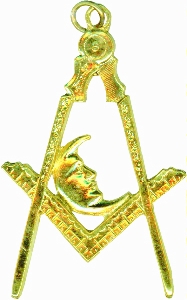 Junior Deacon
Junior Deacon
The jewel of his office is the Square and Compass with the Moon in the center (rather than a sun, as with the Senior Deacon), which signifies that he is in the West. The Junior Deacon of a Masonic Lodge is an assistant officer of the Lodge. He sits to the lower right of the Senior Warden.
The Junior Deacon’s principle roles are to assist the Senior Warden by carrying messages from the Senior Warden in the West to the Junior Warden in the South and to guard the inner door of the Lodge.
It is also his duty to ensure that the Tyler (also spelled “Tiler”) is guarding the outer door and only allowing visitors to enter after they have been properly vouched for. The Junior Deacon and the Tyler communicate with each other by knocking on the door…the Tyler from the outside, the Junior Deacon from the inside.
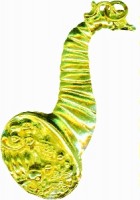 Senior Steward
Senior Steward
His jewel is also the Cornucopia, an exact duplicate of the Junior Steward’s jewel. The Cornucopias signify a “Horn of Plenty”, filled with fresh fruits and vegetables to denote the “fruits of one’s labors” and representing “a job well done“.
The Senior Steward of a Masonic Lodge is an appointed officer of the Lodge. He also understudies the Junior Deacon’s position, filling in for the Junior Deacon when he is absent.
The Junior Deacon’s principle role is to prepare candidates during ritual, escort them to the Lodge room and assist the Senior Deacon. In their entry-Officer positions, both the Senior and Junior Stewards typically handle kitchen duties and act as wait staff for the members during meals or refreshment. The Senior Steward’s position is similar to that of a Supervisor.
 Junior Steward
Junior Steward
Like the Senior Steward, the Junior Steward’s Jewel is also the Cornucopia, and, like the Senior Steward, he is an appointed officer of the Lodge and his position is similar to that of an assistant Supervisor. The Junior Steward understudies the Senior Steward’s position, filling in for the Senior Steward in his absence. The Junior Steward’s principle role is to assist the Senior Steward and the Senior Deacon in the preparation of candidates.
Both the Senior and Junior Stewards carry rods, on top of which are the jewels of their offices. The rods represent England’s Lord High Steward’s rod in the House of Lords.
Lodge Officer duties for those officers NOT in the progressive line:
The following officers do not usually move in the progressive line. Many times they have already progressed through all “the chairs” which are the appointed and elected positions. They may have chosen to serve their Lodge in different positions such as Marshal, Historian or Chaplain. The Treasurers and Secretaries are elected positions and they often serve in those respective positions for many years.
Continuity in these positions is vital to a well-run and efficient Lodge. Learning the duties of these respective positions takes a great deal of time and dedication. If these officer positions changed each year that continuity would be abandoned.
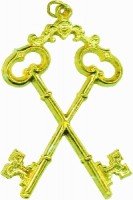 Treasurer
Treasurer
The Treasurer’s jewel is a pair of Crossed Keys, signifying he is the Collector and Distributor of all Lodge monies as he holds the keys to the cash box.
The Treasurer of a Masonic Lodge is the Chief Financial Officer (CFO) of the Lodge. He sits to the right of the Master and beside the Senior Deacon. He is responsible for all financial transactions of the Lodge, receives all money due the Lodge, pays all debts by order of the Worshipful Master with the consent of the Lodge and renders financial reports when requested.
While the Treasurer does not need to be in possession of an accounting degree, past experience with bookkeeping and/or accounting is a definite asset. Financial bookkeeping transactions may be performed either by hand or by the use of accounting software.
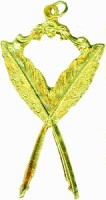 Secretary
Secretary
The Secretary’s jewel is the crossed Quill Pens. He acts as the Lodge Recorder, functioning similarly to a corporate C.O.O. (Chief Operations Officer). The Secretary’s duties require a high degree of Lodge experience, Masonic knowledge, diplomacy and, above all, detailed paperwork skills. The Lodge Secretary is the backbone of any Masonic Lodge and he holds a position of great responsibility. He sits to the left of the Master.
His duties require him to handle all correspondence to the Lodge, taking minutes of Lodge meetings, handling of petitions of new candidates, maintain a continuous Lodge member roster, and many other administrative duties. He compiles an ongoing list of new candidates and tracks which degrees each candidate has undertaken. From his member list, he sends out the annual dues notices and receives dues payments. He communicates with other Lodges and the Grand Lodge, types letters, retrieves the mail and helps the Worshipful Master organize his meetings.
The Secretary must be well versed in Grand Lodge By-Laws for his jurisdiction and his own Lodge By-Laws. A very experienced member usually resides in this chair…he may be a Past (Worshipful) Master of the Lodge. While it is not a prerequisite, due to the number of hours that this position requires, most (but not all) Lodge Secretaries are retired, therefore enabling them to devote the many hours required which are necessary to this position. Depending on location and Lodge preference, the Lodge Secretary is often the only paid position within the Lodge.
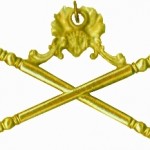 Marshal
Marshal
The Marshal’s jewel is the Crossed Batons. The Marshal, an appointed officer of the Lodge, is the Lodge’s Conductor or Master of Ceremonies.
The Marshal’s duties and principle role is the organization of processions and ensuring the correct precedence and etiquette in formal proceedings. It is his duty to formally conduct visitors into the Lodge and introduce them to the members when the Lodge is in session.
 Tyler (or Tiler)
Tyler (or Tiler)
The Tyler’s jewel is the Sword, by which he symbolically refuses entrance to anyone who is uninitiated in the Craft. The sword has no scabbard, as it is his symbolic duty to always have his sword drawn, ready for the defense of his post.
As an appointed officer of the Lodge, he is sometimes known as the “Outer Guard“, sitting outside the closed door of the lodge room, armed with a sword.
The Tyler’s duties and principle role are to ensure that only those who are duly qualified are allowed to enter the Lodge Room. He guards against “cowans” and “eavesdroppers”. During the Middle Ages, a cowan was an uninitiated or non-apprenticed stonemason who built stone walls of poor quality.
While the Tyler is sometimes called upon to assist in the preparation of candidates, his chief duty is to (symbolically) keep unskilled workmen from overhearing any conversations within the Lodge room that they are not qualified to hear.
After the Lodge members are inside the Lodge room, the door closes and it is the Tyler’s duty to decide whether late arrivals may enter. It is also his duty to make sure that each visitor is “properly clothed”, which means they must be wearing their Masonic apron.
To be fully and properly dressed before entrance into the Lodge room, the visitor must be wearing their apron over the top (on the outside) of their suit coat and the apron strings must be fully tied before the Tyler will allow the visitor entrance. Those present claiming to be visitors from another Masonic Lodge have to answer a number of questions to test their claim of actual membership in the fraternity.
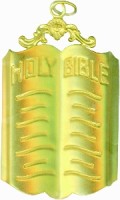 Chaplain
Chaplain
The Chaplain’s jewel of office is an opened book, symbolizing the Volume of Sacred Law. Since Masonry is non-denominational, depending on a member’s individual beliefs, this might be the Christian Bible, Hebrew Torah or Tanach, the Muslim Qur’an, the Hindu Vedas or other Holy Books. He is an appointed officer of the Lodge, sits to the left of the Master and may or may not have any past religious experience.
The Chaplain is the spiritual leader of the Lodge. While he may or may not be a real-world minister, priest, rabbi or Imam, in the Lodge, the Chaplain is responsible for non-denominational prayers at both the opening and closing of meetings, during degree ritual ceremonies and before meals.
Some Lodges in various jurisdictions may also appoint Lodge members as an Organist and a Historian. The Organist, obviously, takes care of music for various Masonic ceremonies within the Lodge.
The Historian maintains a history of the Lodge via writings, photographs and news clippings, and, in our current electronic age, other digital and electronic media.
Read more: http://www.masonic-lodge-of-education.com/
Click here to go to top of page
